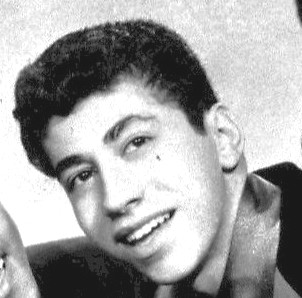Rock and roll is a genre of popular music that evolved in the United States during the late 1940s and early 1950s. It originated from African American music such as jazz, rhythm and blues, boogie-woogie, electric blues, gospel, and jump blues, as well as country music. While rock and roll's formative elements can be heard in blues records from the 1920s and in country records of the 1930s, the genre did not acquire its name until 1954.

Doo-wop is a subgenre of rhythm and blues music that originated in African-American communities during the 1940s, mainly in the large cities of the United States, including New York, Philadelphia, Pittsburgh, Chicago, Baltimore, Newark, Detroit, Washington, D.C., and Los Angeles. It features vocal group harmony that carries an engaging melodic line to a simple beat with little or no instrumentation. Lyrics are simple, usually about love, sung by a lead vocal over background vocals, and often featuring, in the bridge, a melodramatically heartfelt recitative addressed to the beloved. Harmonic singing of nonsense syllables is a common characteristic of these songs. Gaining popularity in the 1950s, doo-wop was "artistically and commercially viable" until the early 1960s and continued to influence performers in other genres.

Franklin Joseph Lymon was an American rock and roll/rhythm and blues singer and songwriter, best known as the boy soprano lead singer of the New York City-based early rock and roll doo-wop group The Teenagers. The group was composed of five boys, all in their early to mid-teens. The original lineup of The Teenagers, an integrated group, included three African-American members, Lymon, Jimmy Merchant, and Sherman Garnes; and two Puerto Rican members, Joe Negroni and Herman Santiago. The Teenagers' first single, 1956's "Why Do Fools Fall in Love", was also their biggest hit. After Lymon went solo in mid-1957, both his career and that of The Teenagers fell into decline. In 1968, Lymon was found dead at the age of 25 on the floor of his grandmother's bathroom from a heroin overdose. Lymon was posthumously inducted into the Rock and Roll Hall of Fame in 1993 as a member of the Teenagers. His life was dramatized in the 1998 film Why Do Fools Fall in Love.

Albert James "Alan" Freed was an American disc jockey. He also produced and promoted large traveling concerts with various acts, helping to spread the importance of rock and roll music throughout North America.

The Teenagers were an American music group, most noted for being one of rock music's earliest successes, presented to international audiences by DJ Alan Freed. The group, which made its most popular recordings with young Frankie Lymon as lead singer, is also noted for being rock's first all-teenaged act. They were inducted into the Rock and Roll Hall of Fame in 1993.

American Bandstand (AB) is an American music-performance and dance television program that aired regularly in various versions from 1952 to 1989, and was hosted from 1956 until its final season by Dick Clark, who also served as the program's producer. It featured teenagers dancing to Top 40 music introduced by Clark. The program was televised from Philadelphia from its 1952 debut until its move to Los Angeles in 1963.

Richard "Dick" Wagstaff Clark was an American television and radio personality and television producer who hosted American Bandstand from 1956 to 1989. He also hosted five incarnations of the Pyramid game show from 1973 to 1988 and Dick Clark's New Year's Rockin' Eve, which broadcast New Year's Eve celebrations in New York City's Times Square.

Herman Santiago is a Puerto Rican rock and roll pioneer and songwriter who was previously a member of the vocal group Frankie Lymon and the Teenagers. He (disputedly) co-wrote the group's iconic hit "Why Do Fools Fall in Love".

Hullabaloo was an American musical variety series that ran on NBC from January 12, 1965, through April 11, 1966. Similar to ABC's Shindig! and in contrast to American Bandstand, it aired in prime time.
The Buddy Deane Show is an American teen dance television show, created by Zvi Shoubin, hosted by Winston "Buddy" Deane (1924–2003), and aired on WJZ-TV, the ABC affiliate station in Baltimore from 1957 until 1964. It is similar to Philadelphia's American Bandstand.

Joe Negroni was an American singer of Puerto Rican descent. He was a rock and roll pioneer and founding member of the rock and roll group Frankie Lymon and the Teenagers.

Jamboree, known as Disc Jockey Jamboree in the United Kingdom, is a 1957 American rock and roll film directed by Roy Lockwood. Its story is about a boy and girl, Pete Porter and Honey Wynn, who become overnight sensations as a romantic singing duo who run into trouble when their squabbling managers, try to turn them into solo acts. Against this backdrop in cameo performances appear some of the biggest names of rock and roll in the 1950s lip-syncing to their recordings.
Lawrence "Larry" Peerce is an American film and TV director whose work includes the theatrical feature Goodbye, Columbus (1969), the early rock and roll concert film The Big T.N.T. Show (1965), One Potato, Two Potato (1964), The Other Side of the Mountain (1975) and Two-Minute Warning (1976).

Rock, Rock, Rock! is a 1956 musical drama film conceived, co-written and co-produced by Milton Subotsky and directed by Will Price. The film is an early jukebox musical featuring performances by established rock and roll singers of the era, including Chuck Berry, LaVern Baker, Teddy Randazzo, the Moonglows, the Flamingos, and the Teenagers with Frankie Lymon as lead singer. Later West Side Story cast member David Winters is also featured. Famed disc jockey Alan Freed made an appearance as himself.
The Delicates, were an American three-girl singing group, made up of members Denise Ferri, Arleen Lanzotti, and Peggy Santiglia. The group was formed in 1958 while all three members were attending Elementary School No. Eight, in Belleville, New Jersey, United States.
Kathleen Elizabeth "Bunny" Gibson is an actress and former regular dancer on the American Bandstand television program. Teen magazines referred to her as "American Bandstand's Sweetheart" and Dick Clark called her a "national symbol" receiving thousands of letters each week.
The Dick Clark Show was an American musical variety show broadcast weekly in the United States on the ABC television network 7:30-8 p.m. on Saturdays from February 15, 1958, through September 10, 1960, sponsored by Beechnut Gum.
The Big Beat is an American music and dance television program broadcast on the ABC Network in 1957. It was hosted by Alan Freed, and subsequently by Richard Hayes. The program debuted on May 4, 1957, four months before American Bandstand, making it the United States' "first nationally-televised rock 'n roll dance show".
Mr. Rock 'n' Roll: The Alan Freed Story is a 1999 American television film directed by Andy Wolk and starring Judd Nelson as Alan Freed. It is based on John A. Jackson's book Big Beat Heat: Alan Freed and the Early Years of Rock & Roll.









